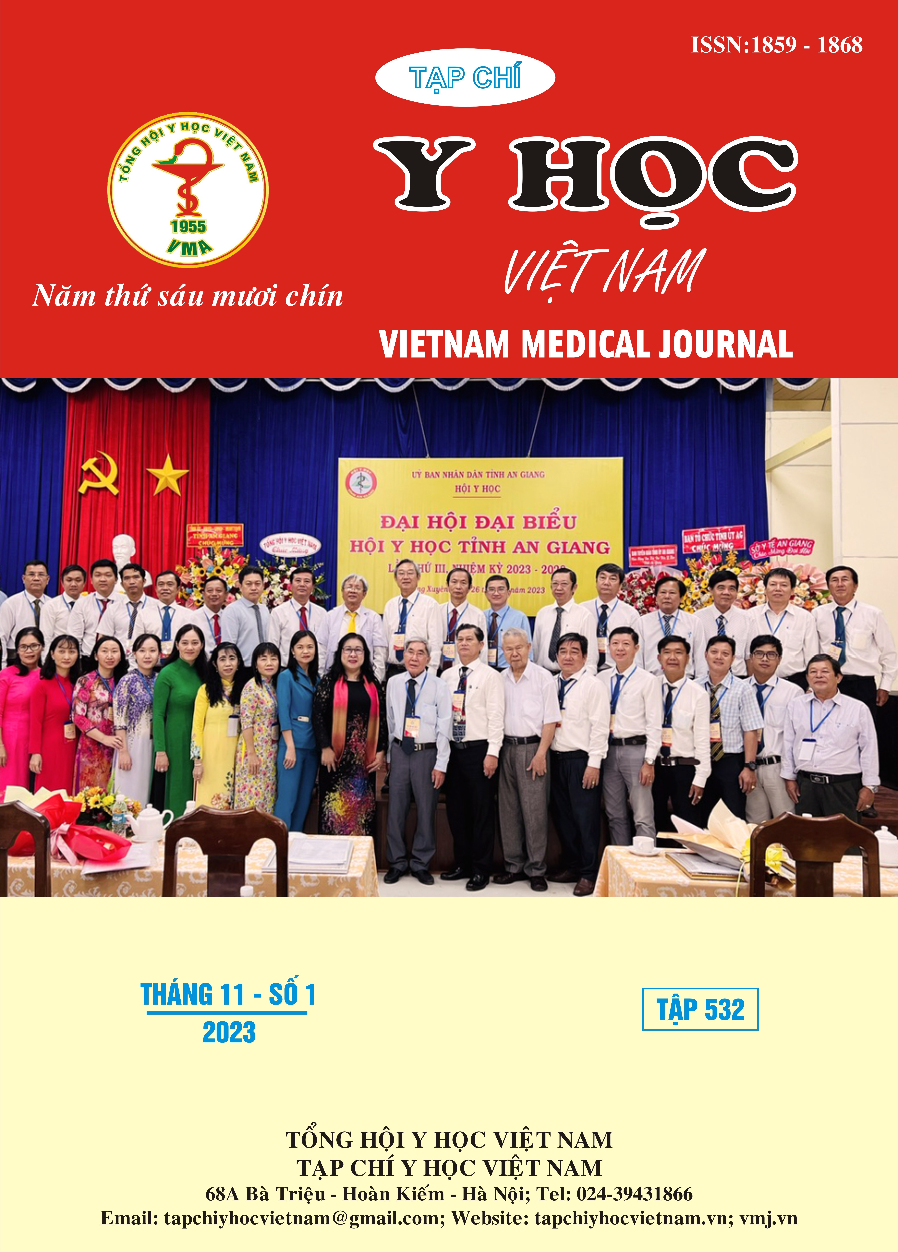THE RESULTS OF TREATMENT OF EGFR MUTATION WITH BRAIN METASTATIC IN NON SMALL CELL LUNG CACNER BY TYROSIN KINASE INHIBITORS 1ST AND 2ND GENERATION
Main Article Content
Abstract
Objectives: To describe some clinical and paraclinical features of brain metastatic non-small cell lung cancer with EGFR mutations by 1st and 2nd generation tyrosin kinase inhibitors. Evaluation of the treatment results of the study group of patients. Subjects and methods: a retrospective descriptive study on 89 patients with brain metastatic non-small cell lung cancer with EGFR mutations who received first-line treatment with 1st and 2nd generation TKIs at K hospital since 04/2019 to 04/2023. Results: In the study, the number of patients receiving first-line treatment with erlotinib, gefitinib and afatinib were 33, 34, 22, respectively. The average age of participating in the study was 59.6 ± 9.50 years old, of which male accounted for 48,3%, female accounted for 51,7%. All patients had common gene mutations in which, 60.7% of patients had Del19 mutation and 39.3% had L858R mutation. 53.9% of patients in the study were treated in combination with brain tumor radiosurgery, 20.2% were treated with whole brain radiation. The disease control rate was 94,4%, the median mPFS progression-free survival was 12,6 months; progression-free survival at 12 months was 54,7%. The intracranial response rate was 96,6%, the median cerebral mPFS was 14,7 months. Common side effects in clinical and subclinical are rash common in 49,4%, diarrhea in 22,5%, interstitial inflammation in 19,1%, increase in liver enzymes in 37,1%, decrease in hemoglobin in common in 30,3% of treated patients, mainly grade 1, 2. Conclusion: TKIs treatment step 1 in the group of subjects with brain metastatic NSCLC with EGFR mutation achieved a high response rate, improved PFS, and tolerable mild toxicity.
Article Details
Keywords
non-small cell lung cancer, brain metastasis, EGFR gene mutation, first-line treatment of 1st and 2nd generation TKIs
References
2. Erratum: Global cancer statistics 2018: GLOBOCAN estimates of incidence and mortality worldwide for 36 cancers in 185 countries. CA Cancer J Clin. 2020;70(4):313.
3. Abdallah SM, Wong A. Brain metastases in non-small-cell lung cancer: are tyrosine kinase inhibitors and checkpoint inhibitors now viable options? Current oncology (Toronto, Ont). 2018;25(Suppl 1):S103-s114.
4. Soria JC, Ohe Y, Vansteenkiste J, et al. Osimertinib in Untreated EGFR-Mutated Advanced Non-Small-Cell Lung Cancer. The New England journal of medicine. 2018;378(2):113-125.
5. Magnuson WJ, Lester-Coll NH, Wu AJ, et al. Management of Brain Metastases in Tyrosine Kinase Inhibitor-Naïve Epidermal Growth Factor Receptor-Mutant Non-Small-Cell Lung Cancer: A Retrospective Multi-Institutional Analysis. Journal of clinical oncology : official journal of the American Society of Clinical Oncology. 2017;35(10):1070-1077.
6. Hoàng Anh Vũ CVĐ, Ngô Thị Tuyết Hạnh và cs. Đột biến gen EGFR và KRAS trên bệnh nhân ung thư phổi không tế bào nhỏ Tạp chí Y học TP Hồ Chí Minh. 2011;14:166 - 172.
7. Huyền NTT. Đánh giá kết quả điều trị ung thư phổi không tế bào nhỏ di căn não đột biến EGFR bằng Erlotinib có hoặc không kết hợp với xạ trị toàn não. 2018:66 - 71.
8. Kiên NV. Đánh giá kết quả điều trị ung thư phổi không tế bào nhỏ di căn não bằng thuốc ức chế tyrosin kinase kết hợp với xạ phẫu tại bệnh viên Bạch Mai. 2021.


